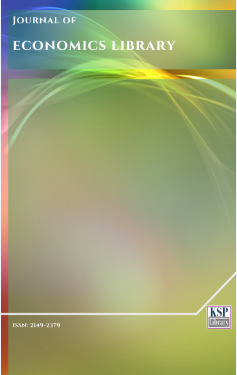Empirical analysis of relationship between investment, good governance and GDP growth rate in Pakistan (1996-2016)
Abstract
Abstract. Progress and prosperity of the nations, directly or indirectly depend on economic growth of the country. High and stable GDP growth rate indicate economic strength of the nation, which depend on various economic and non-economic factors. Investment (i.e. both private and public) provides significant contribution to the economic growth and development in a country. On the other hand, non-economic factors also play an important role in developing productive environment and enhancing productive capacity of the economy. Pakistan is a developing country and its weak and unstable economy demands high and stable GDP growth rate while it is subsisting on low and unstable GDP growth rate. Therefore, it is required to explore major economic and non-economic factors that hinder the GDP growth rate in Pakistan. In order to find out empirical impact of economic and non-economic factors on GDP growth rate in Pakistan, ARDL approach was applied on time series data during the period of 1996 to 2016. Empirical results confirmed the existence of log run relationship between dependent and independent variables. In addition, the speed of adjustment was not found to be very high (i.e. -0.35362). On the basis of study results, therefore, it is suggested that there is a need of economic reforms and implementation of effective policies that can make economy of Pakistan strong and stable, which in turn enable the country’s economy to grow faster and to compete in international market.
Keywords. Private investment, Gross Domestic Product, Political stability, Corruption, Economic growth, Time series data, Pakistan.
JEL. F40, F43.
Keywords
References
Ali, A.M. (2001). Political instability, policy uncertainty and economic growth: An empirical investigation. Atlantic Economic Journal, 29(1), 87-106. doi. 10.1007/BF02299934
Aisen, A. & Veiga, F.J. (2006). Does political instability lead to higher inflation? A panel data analysis, Journal of Money, Credit and Banking, 38(5), 1379-1389. doi. 10.1353/mcb.2006.0064
Ang, J.B. (2009). Do public investment and FDI crowd in or crowd out private domestic investment in Malaysia?, Applied Economics, 41, 913-919. doi. 10.1080/00036840701721448
Badawi, A. (2005). Private capital formation and macroeconomic policies in Sudan: application of a simple cointegrated vector autoregressive model. [Retrieved from].
Busse, L., Ishikawa, N., Mitra, M., Primmer, D., Surjadinata, K., & Yaveroglu, T. (1996). The perception of corruption: A market discipline approach, Working Paper, Atlanta: Emory University.
Cartier-Bresson, J. (2000). Economics of corruption. Organization for Economic Cooperation and Development. The OECD Observer, 220. [Retrieved from].
Grindle, M.S. (2004). Good enough governance: poverty reduction and reform in developing countries. Governance, 17(4), 525-548. doi. 10.1111/j.0952-1895.2004.00256.x
Erden, L. & Holcombe, R.G. (2005). The effects of public investment on private investment in developing economies, Public Finance Review, 33(5), 575-602. doi. 10.1177/1091142105277627
Ghali, K.H. (1998). Public investment and private capital formation in a vector error correction model of growth, Applied Economics, 30(6), 837-844. doi. 10.1080/000368498325543
Ghura D. (1997). Private investment and endogenous growth evidence from Cameron. IMF Working Paper, No.97/166. [Retrieved from].
Hassler, U., & Wolters, J. (2006). Autoregressive distributed lag models and co-integration. Allgemeines Statistisches Archiv, 90(1), 59-74. doi. 10.1007/s10182-006-0221-5
Javaid, U. (2010). Corruption and its deep impact on good governance in Pakistan. Pakistan Economic and Social Review, 48(1), 123-134.
Khan, M.S., & Kumar, M.S. (1997). Public and private investment and the growth process in developing countries. Oxford Bulletin of Economics and Statistics, 59(1), 69-88. doi. 10.1111/1468-0084.00050
Khan, M.S. & Reinhart, C., (1990). Private investment and economic growth in developing countries. World Development, 18(1), 19-27. doi. 10.1016/0305-750X(90)90100-C
Naqvi, N.H. (2002). Crowding-in or crowding-out? Modelling the relationship between public and private fixed capital formation using co-integration analysis: The case of Pakistan 1964-2000. Pakistan Development Review, 41(3), 255-276.
Rani, K., & Batool, Z. (2016). Impact of political instability and foreign direct investment on economic development In Pakistan. Asian Economic and Financial Review, 6(2), 83-89. doi. 10.18488/journal.aefr/2016.6.2/102.2.83.89
Dritsakis, N., & Adamopoulos, A. (1987). A causal relationship between government spending and economic development: an empirical examination of the Greek economy, Applied Economics, 36(5), 457-464. doi. 10.1080/00036840410001682151
Pesaran, M.H., Shin, Y., & Smith, R. (2001). Bounds testing approaches to the analysis of level relationships, Journal of Applied Econometrics, 16(3), 289-326. doi. 10.1002/jae.616
Khan, S., & Khan, M.A. (2007), What determine private investment? Case of Pakistan, PIDE Working Paper, No.2007/36. [Retrieved from].
Khan, S.U., & Saqib, O.F. (2008). Political instability and inflation in Pakistan, MPRA Paper, No.13056. [Retrieved from].
Shaikh, N.A., Shah, P., & Shah, N. (2015) Empirical estimation of GDP determinants, household consumption expenditure and the consumption multiplier in Pakistan (1985-2011), Journal of Economics and Political Economy, 2(2), 317-330.
Todaro, M., & Smith, S. (2003). Economic development (8th Ed.). Boston: Addison.
Wesley Transparency International, (2013) Global Corruption Barometer, [Retrieved from].
World Bank, (2016). [Retrieved from].
Word Bank, (2018). Worldwide Governance Indicators Project. [Retrieved from].
DOI: http://dx.doi.org/10.1453/jel.v5i3.1734
Refbacks
- There are currently no refbacks.
.......................................................................................................................................................................................................................................................................................................................................
Journal of Economics Library - J. Econ. Lib. - JEL - www.kspjournals.org
ISSN: 2149-2379
Editor: jel@ksplibrary.org Secretarial: secretarial@ksplibrary.org Istanbul - Turkey.
Copyright © KSP Library

